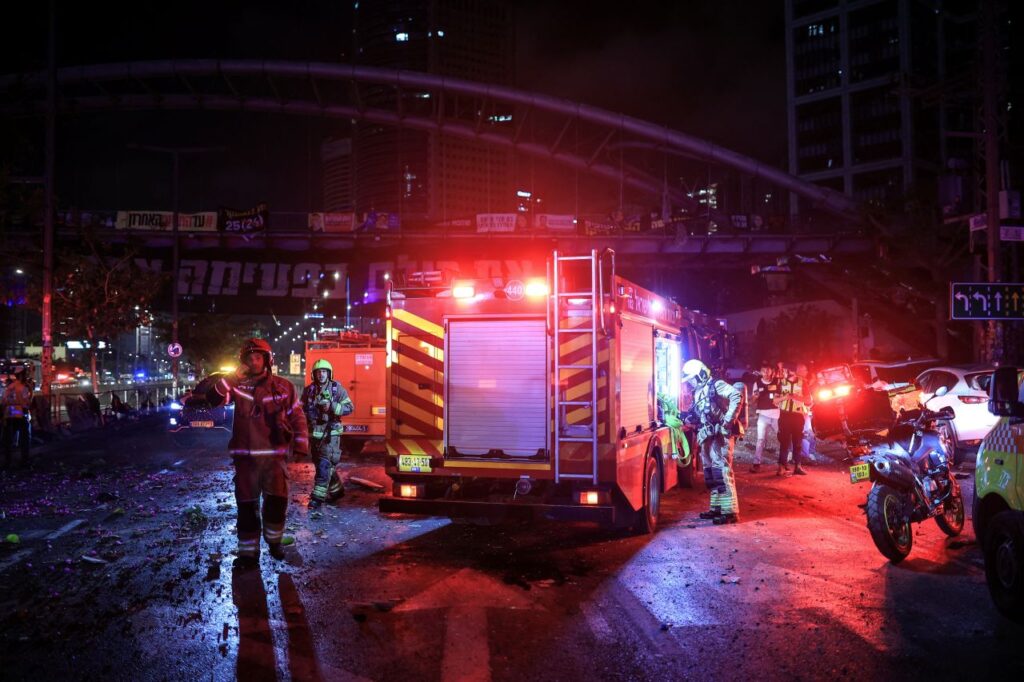
Tehran, Tel Aviv Rocked by Escalating Violence
On June 14, 2025, Iran launched a significant retaliatory missile attack on Israel, firing approximately 100 ballistic missiles in multiple waves, targeting cities including Tel Aviv and Jerusalem. This barrage came in response to Israel’s large-scale airstrikes on Iranian nuclear facilities and military targets, which killed senior military commanders and scientists, marking a sharp escalation in the long-standing tensions between the two nations. The Israeli Defense Forces (IDF) reported that at least 41 people were injured across Israel, with significant damage to residential and commercial areas, particularly in the Ramat Gan area near Tel Aviv.
Iran’s Retaliatory Strike: Operation “True Promise 3”
Iran’s Islamic Revolutionary Guard Corps (IRGC) claimed responsibility for the missile strikes, dubbed “True Promise 3,” targeting dozens of Israeli military positions. According to the IDF, while many missiles were intercepted by Israel’s advanced Iron Dome defense system, some warheads breached the defenses, causing explosions and destruction in central Israel. Emergency services reported one confirmed death and at least 41 injuries, with two individuals in serious condition and others suffering from shrapnel wounds or anxiety-related issues. Residential buildings and vehicles in Tel Aviv’s Ramat Gan area were heavily damaged, prompting search and rescue operations to assist trapped residents.
Iranian state media reported that the strikes were a direct response to Israel’s operation, codenamed “Rising Lion,” which targeted Iran’s key nuclear enrichment facilities in Natanz and Fordo, as well as a research center in Isfahan. The Israeli strikes, involving over 200 aircraft and pre-positioned explosive drones, also killed high-ranking IRGC officials, including General Mohammad Bagheri, who oversaw Iran’s missile capabilities, and General Gholam-Reza Marhabi, a senior intelligence officer. Iran’s ambassador to the United Nations, Amir Saeid Iravani, claimed that Israel’s attacks killed 78 people and injured 320, predominantly civilians, including 20 children in a Tehran housing complex.
Israel’s Response and Regional Implications
Israel’s military confirmed ongoing operations in Tehran, targeting Iranian air force bases and missile defense systems. Prime Minister Benjamin Netanyahu expressed regret for the three Israeli fatalities but vowed that “Tehran will burn” if Iran continued its attacks. Defense Minister Israel Katz stated that Iran had “crossed red lines” by targeting civilian areas, promising a heavy price for the aggression. The IDF urged citizens to remain vigilant, with air raid sirens sounding nationwide and checkpoints to the West Bank closed, restricting Palestinian movement.
The United States, Israel’s key ally, played a role in intercepting Iranian missiles, with U.S. troops at bases in Iraq and Syria taking shelter during the attacks. However, U.S. involvement was reportedly more limited compared to previous Iranian strikes in 2024. President Donald Trump praised Israel’s actions but warned Iran of severe consequences unless it scaled back its nuclear ambitions. Iran, in turn, threatened retaliatory strikes on U.S., UK, and French military bases if they continued to support Israel’s defense efforts.
Global Concerns and Humanitarian Impact
The exchange of missile strikes has raised fears of a broader regional conflict, potentially drawing in global powers. The closure of diplomatic missions and flight diversions across the Middle East underscored the escalating tensions. In Iran, state media reported significant civilian casualties, while in Israel, emergency crews worked to rescue residents from collapsed buildings. The international community, including the United Nations, expressed alarm, with the UN’s nuclear watchdog head warning that attacks on nuclear facilities are unacceptable under any circumstances.
Background of the Conflict
The latest hostilities follow Israel’s preemptive strikes on June 13, 2025, aimed at crippling Iran’s nuclear program and military leadership. Israel’s operation was described as one of its largest in decades, targeting over 100 sites with the assistance of Mossad operatives on Iranian soil. Iran’s retaliatory missile and drone attacks, which began hours later, marked a significant escalation, with some missiles penetrating Israel’s multilayered air defenses. The conflict has further strained U.S.-Iran nuclear talks, with Iran deeming dialogue “meaningless” in light of the attacks.
Looking Ahead
As both nations continue to trade threats and military actions, the situation remains volatile. Israel’s ongoing airstrikes in Iran and Iran’s vow for further retaliation signal a dangerous trajectory that could destabilize the region. The international community faces mounting pressure to mediate and prevent a full-scale war, while civilians in both countries bear the brunt of the violence.
Sources: Reuters, CNN



